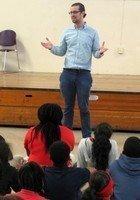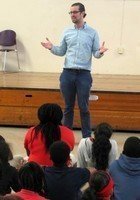Connect with hundreds of tutors like Owen
Who needs tutoring?
FEATURED BY
TUTORS FROM
- YaleUniversity
- PrincetonUniversity
- StanfordUniversity
- CornellUniversity

Owen
About Me
As an educator, I have always worked to teach my students principles and skills that can apply in many situations, both in the classroom and in their everyday lives. I live and work based on principles as well, and they are relatively simple. First and foremost: all students can learn. Some will struggle in some areas, but struggling does not indicate inability. I have personally worked with students who have been described as unable to function in a classroom, or incapable of meeting high expectations, and I have watched those students grow immensely when given the opportunity. The impact of a caring, positive environment of people who believe in a student cannot be overstated. One of my seventh graders, who had not grown at all as a reader after a year in a classroom setting, attended a small group summer program that I facilitated. Her teachers had become concerned that she may simply be stuck at her 3rd grade reading level. However, in a focused, small group setting, with appropriate support, she made 5 months of progress in two weeks. I could give numerous examples, but they all come back to the same point: all students can learn. My second principle relates to the first: high expectations and proper support are a pathway to success. High expectations are an educator's way of saying, "I believe in you" to their students. Throughout my career, when I have challenged my students, they have risen to meet it and walked away from the experience glowing with pride. I have directed middle school students performing Shakespeare and watched them go above and beyond to create a beautiful production. I have confronted a reading group with a book two years above their reading levels and seen them respond by growing rapidly as readers. When we expect greatness from our students, and support them on their path, we can see success that goes far beyond our initial impressions of their capabilities.
Education & Certifications
Test Scores
Perfect ScoreQ&A with Owen
Connect with a tutor like Owen
Connect with a tutor like Owen
Tutors with Similar Experience



